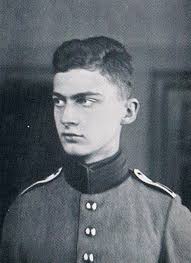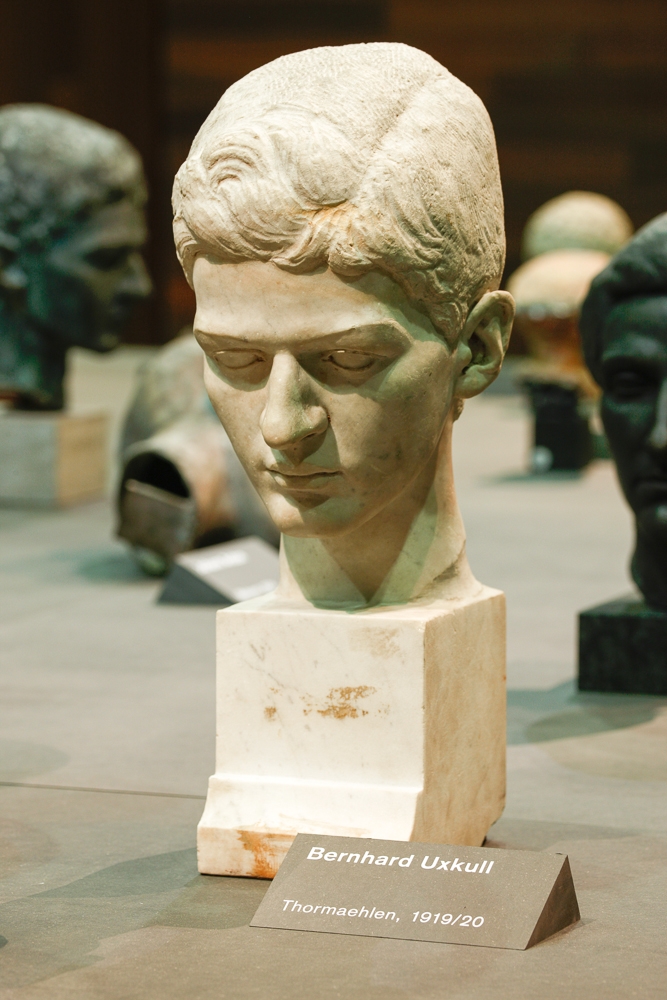
BURIED TOGETHER
Partner
Adalbert Cohrs
Queer Places:
Friedhof Kaldenkirchen, Am Friedhof 6B, 41334 Nettetal, Germany
 Bernhard Victor Graf Uxkull-Gyllenband (September 8, 1899 – July 29, 1918)
was a German poet. His brother
Woldemar Graf
Uxkull-Gyllenband had a
same-sex affair with Percy Gothein
to whom he dedicated his book on Greek
sculpture taking a line from a verse that Bernhard Uxkull had written to his
own same-sex lover: "We rarely had a rich day when love did not course though
our blood."
Bernhard Victor Graf Uxkull-Gyllenband (September 8, 1899 – July 29, 1918)
was a German poet. His brother
Woldemar Graf
Uxkull-Gyllenband had a
same-sex affair with Percy Gothein
to whom he dedicated his book on Greek
sculpture taking a line from a verse that Bernhard Uxkull had written to his
own same-sex lover: "We rarely had a rich day when love did not course though
our blood."
Bernhard Uxkull-Gyllenband was the son of Woldemar Graf von Üxküll-Gyllenband and Lucy Therese von Wangenheim.
His brother was
Woldemar Graf Uxkull-Gyllenband. Other siblings are Eleanore Alexandra freiin von Wangenheim; Hans-Heinz von Wangenheim
and Baroness Lucie von Wangenheim. He became a friend of
Stefan George in 1907 through
Ernst Morwitz, a judge in the Berlin High Court of Appeal.
Bernhard Graf von
Uxkull Gyllenband and
his lover Adalbert Cohrs killed themselves on July 28, 1918,
in the failed attempt to
desert to Holland. They
had made the decision to flee
to the neutral Netherlands. The young count was an officer cadet in the
Prussian Field Artillery First Guards Regiment, Cohrs,
son of a well-known Luther researcher, was a lieutenant.
In
Berlin they had asked a soldier from Lobberich for an escape route across
the border and had been referred to a Lobbericher known as a smuggler who
would show them the way. The
smuggler reported them to the local police and during the
interrogation in the imperial barracks on Poststrasse in Kaldenkirchen,
the two shot themselves in separate rooms. Count Uxkull was instantly
dead; Lieutenant Cohrs died in the hospital a day later.
They were buried in the
Protestant cemetery in Kaldenkirchen, where a memorial stone is still
commemorating them.
The pistol shots of
July 28th were followed by hectic investigations that continued well into
August. Count Uxkull, not
yet 19 years old, a relative of the Hitler assassin
Claus Graf Schenk von
Stauffenberg (Stauffenberg's mother was born Uxkull) and born at
Schloss Wallwitz, Guben district, was considered a hopeful young poet in
the George Freundeskreis, whose poems Stefan George published in the
"Sheets for Art".

Ludwig Thormaehlen
Not only
the brothers Claus and Berthold von Stauffenberg were connected to George, but
also Hugo von Hofmannsthal and many others, to whom he had a very unique
fascination. But the poet was obviously particularly close to the young
officer candidate Uxkull. Nothing could prove this more emphatically than the
poem that Stefan George wrote in Königstein im Taunus in 1918 under the
impression of the news of death from Kaldenkirchen and which was included in
the Echtermeyer / von Wiese poetry collection, which was the poem anthology
par excellence at countless high schools:
You slim and pure like a
flame, you like the morning tender and light, you blooming rice of noble
origin, you like a spring secret and simple
Accompany me on sunny mats, shiver me in the evening smoke, illuminate my path in the shade,
you cool wind you hot breath
You are my wish and my thought, I breathe you with every breath, I sip you with every drink, I kiss you with every fragrance
You flowering rice of noble origin, you like a source secret and simple, you slim and pure like a flame, you like tomorrow tender and light.
Painter Ernst Heckel recalled
the two in his Erfurt murals. Sculptor Ludwig Thormaehlen created a
young man's head in 1920, depicting Bernhard Graf von Uxkull.
My published books:


BACK TO HOME PAGE

-
https://rp-online.de/nrw/staedte/nettetal/1918-erschossen-sich-die-george-juenger-adalbert-cohrs-und-bernhard-graf-von-uxkull-gyllenband-in-nettetal-kaldenkirchen_aid-24346213
- Stauffenberg: A Family History, 1905-1944
Peter Hoffmann
McGill-Queen's Press - MQUP, 2003


 Bernhard Victor Graf Uxkull-Gyllenband (September 8, 1899 – July 29, 1918)
was a German poet. His brother
Bernhard Victor Graf Uxkull-Gyllenband (September 8, 1899 – July 29, 1918)
was a German poet. His brother

